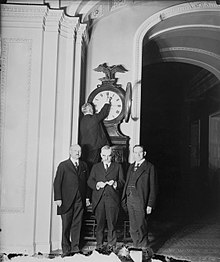US House committee approves daylight saving time amendment
Thursday, April 7, 2005

The U.S. House Energy and Commerce Committee passed an amendment on Wednesday to extend daylight saving time by two months. The bipartisan measure is sponsored by Representative Fred Upton, Republican of Michigan, and Representative Ed Markey, Democrat of Massachusetts.
"The more daylight we have, the less electricity we use," Representative Ed Markey said. Markey also supported the measure by pointing out the business benefits. "There's more economic activity, because people feel they can walk around safely," he said.
"Extending daylight-saving time makes sense, especially with skyrocketing energy costs," Rep. Fred Upton said.
The bill extends daylight saving time to begin on the first Sunday in March and to end on the last Sunday in November. Daylight saving time currently begins on the first Sunday in April and ends on the first Sunday in October.
The U.S. Department of Transportation estimates that extending daylight saving time would save 10,000 barrels of oil per day. The United States consumes approximately 20 million barrels of oil per day.
The House is planning to approve the energy bill to which the amendment was attached in several weeks. Several other amendments to the bill are still being debated.
Related news
edit- "Time for North Americans to spring ahead one hour" — Wikinews, April 3, 2005
Sister links
editSources
edit- Tom Doggett. "US lawmakers want daylight-saving time change" — Reuters, April 7, 2005
- UPI. "House panel moves to extend Daylight Saving" — ScienceDaily, April 7, 2005
- AP. "Congress may extend daylight-saving time" — CNN, April 7, 2005
External links
edit- "Daylight Savings Change Proposed" — Slashdot, April 7, 2005
- Mr. Upton of Michigan. "Amendment #6" — U.S. House of Representatives: The Committee on Energy and Commerce, April 6, 2005
- "Energy Committee minutes" — U.S. House of Representatives: The Committee on Energy and Commerce, April 6, 2005